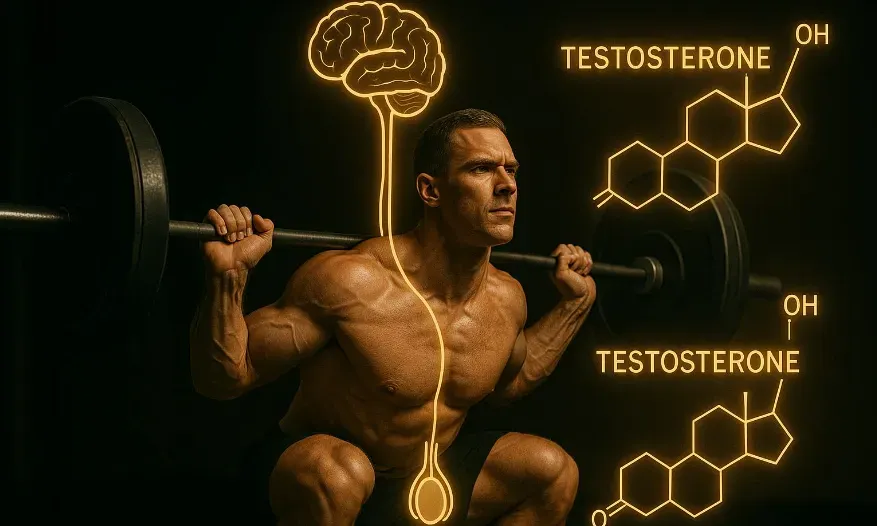6 Natural Ways to Boost Testosterone and Regain Hormonal Edge

Testosterone is far more than just the “male sex hormone.” It’s a key player in muscle development, fat metabolism, mood, energy levels, and even cognitive clarity. And while it’s true that testosterone levels decline naturally with age, the modern lifestyle—packed with stress, poor sleep, processed food, and inactivity—has accelerated that process for many men.
If you're feeling more tired than usual, struggling to lose fat, or noticing a dip in drive and motivation, low testosterone might be playing a role. The good news? You don’t need synthetic hormones to fight back. These six natural strategies can help you raise your testosterone levels and restore balance in your body.
1. Train Smart: Strength Training & HIIT
Lifting heavy things is one of the most effective ways to boost testosterone—naturally. Resistance training, especially compound lifts like squats, deadlifts, and presses, sends a clear signal to your endocrine system that your body needs to adapt. That signal starts in the hypothalamus and moves through the pituitary, prompting a release of luteinizing hormone (LH), which tells your testes to produce more testosterone.
High-Intensity Interval Training (HIIT) can also do the trick. Short bursts of all-out effort followed by brief recovery periods trigger a hormonal surge that includes testosterone. The key is intensity—casual cardio won’t get the same results. Aim for 3 to 4 strength or HIIT sessions each week to keep your hormone levels firing on all cylinders.
2. Sleep Like It Matters—Because It Does
Most of your daily testosterone is produced while you sleep, particularly during REM sleep. Shortchanging your rest—even by a couple of hours—can significantly blunt testosterone output. Chronic sleep deprivation leads to elevated cortisol levels, the body’s primary stress hormone, which actively suppresses testosterone production.
Consistently getting 7 to 9 hours of quality sleep per night isn’t a luxury—it’s non-negotiable. Make your bedroom cool, dark, and quiet. Limit screen exposure in the evening, and stick to a consistent bedtime. Your hormonal health depends on it.
3. Eat to Fuel Your Hormones
Forget low-fat and low-carb extremes. Your body needs the right balance of protein, healthy fats, and micronutrients to produce testosterone efficiently.
- Protein supports muscle repair and helps keep body fat in check, which is key because fat tissue increases the conversion of testosterone to estrogen.
- Healthy fats, like those from salmon, olive oil, avocado, and whole eggs, are essential building blocks for steroid hormone production.
- Micronutrients such as zinc and vitamin D are especially critical. Zinc supports Leydig cell function (where testosterone is made), and vitamin D acts almost like a hormone itself, directly influencing testosterone synthesis.
Think whole foods, not fads. A daily intake that includes quality proteins, healthy fats, and mineral-rich vegetables can keep your testosterone-producing machinery humming.
4. Drop Excess Body Fat
Carrying extra weight—especially around the midsection—does more than affect your appearance. Fat cells, particularly those in visceral fat, are metabolically active and contain an enzyme called aromatase. Aromatase converts testosterone into estrogen, disrupting your hormonal balance.
Even worse, high body fat is linked to insulin resistance and chronic inflammation—two enemies of optimal testosterone production. The solution isn’t complicated: reduce your intake of processed foods and added sugars, move more, and let your body composition shift in your favor. Losing just 5–10% of your body weight can trigger a noticeable uptick in testosterone levels.
5. Soak Up the Sun—or Supplement Smartly
Vitamin D isn’t just for bones. It behaves like a hormone in the body and binds to receptors in the testes, playing a direct role in testosterone production. Studies show that men with higher vitamin D levels also tend to have higher testosterone levels.
Spending 15–30 minutes in the midday sun (arms and legs exposed) several times a week can help keep your vitamin D levels healthy. During the winter or in low-light climates, a vitamin D3 supplement—preferably paired with vitamin K2—can fill the gap. Get your levels tested if you’re unsure, and aim to stay in the optimal range of 40–60 ng/mL.
6. Cut Out Smoking and Limit Alcohol
Smoking and excessive alcohol are like kryptonite for testosterone. Both increase oxidative stress in the body and interfere with testicular function. Alcohol also decreases luteinizing hormone (LH) secretion and lowers zinc absorption—directly impairing testosterone synthesis.
Long-term alcohol use damages Leydig cells and reduces sperm quality. Cigarette smoking further disrupts hormone levels and reduces blood flow, which can impact sexual function. Reducing or eliminating these habits can lead to a measurable improvement in testosterone levels and overall health in a matter of weeks.
Final Thoughts
Testosterone doesn’t work in isolation—it’s influenced by your entire lifestyle. These six strategies are more than just hormone hacks; they’re sustainable habits that build a healthier, stronger, more energized version of you.
Think of this like tending a fire. You need fuel (food), oxygen (movement), space (stress management), and time (rest). If you care for the whole system, testosterone production takes care of itself.
